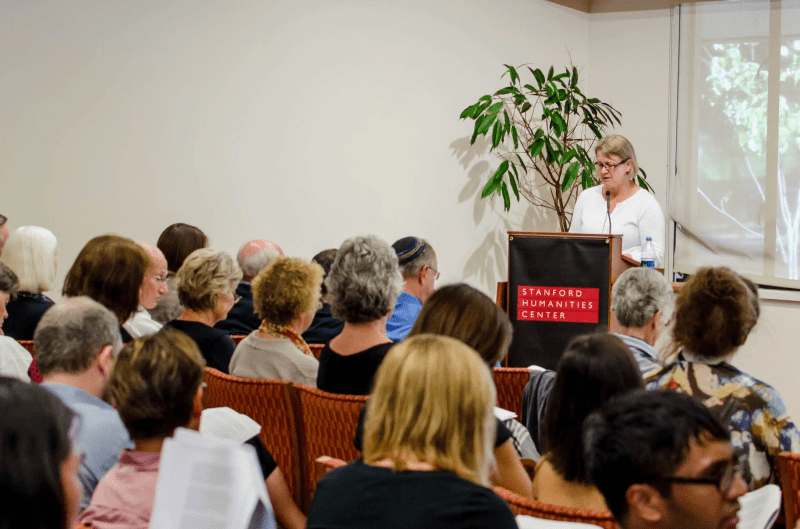In his column “A Spectator,” a name inspired by Addison and Steele, Ben sets his sights on new frontiers of the navel — and sometimes beyond.
To whom it may concern at the Stanford Humanities Center,
I recently attended the reading of a wonderful poet on a nice rainy night at your center. This was the first time I had been inside the center, though I pass it every day and always note its attractive mid-century character, especially compared to the unattractive mid-century character of so many other buildings on campus. Though the reading itself was lovely, I’m writing to inform you that the experience was nearly ruined by the quality of light in your reading room. The light inside this room is too bright and too cold. The room appears to have been designed originally with a cozy and congenial idea in mind of reading and listening. With its low, warm-stained beams and built-in bookshelves, it has the feel of an alpine library. Somewhere along the way, whether or not you were aware of it, recessed lights were installed, along with baffling rows of spotlights, which on this night, shone additional beams at random members of the audience.
Whoever sat in this room appeared to be subject to an active interrogation for a terrible crime. There was no corner, even in the recesses of bookshelves, with a shadow. The books and windows were rendered flat, and may as well have been painted on the walls. This was the light to inspect moles under. My friend and I, both young and attractive, looked devastated and anemic in this light. I felt a pressure on our friendship which was unprecedented. This light was like the light that would precede a nuclear blast. The poet read something stark about the death of her mother, and when he finished I thought … Well yes, yes that’s right … and much worse too. A dear professor of mine tried to speak with me afterwards, and my tongue kept sticking in my jaw. There was nothing to say.
It was the light of a mind of no possibilities, the still, tinnitus light, with water dripping outside, lonelier than a Hopper painting. Whoever has chosen or approved this light has chosen to ignore her instinctual knowledge of what it means — in fact it refers very exactly, as if in words, to the despair which exists at all times of night in every city on earth. A man sits in a room which is just shapes, and outside the city is also just shapes, and no textures. His children are grown and have ideas just different enough from his own to produce distance, and his marriage is strained, and his life — oh, it is entirely over.
We all know the light of this man, in which simple objects rear up and become menacing. A pencil, a dusty mug. Are any dignified and imaginative years of my life over?
I understand that California has recently outlawed incandescent light bulbs, and I understand that beauty in everyday life is at the moment considered inconsequential, if not evil, and I also understand that this tone of fluorescent lighting is more or less standard in campus buildings, so that, walking here at night, it is common and maybe encouraged to feel as though one were a wayward spirit observing the rooms of purgatory, where other shades sodder or learn about guilt, having forgotten ideas like day and night along with the rhythm of the seasons, leaves falling into a pond outside the window, and the unexpectant smile of one you love, by the light of a small bedside lamp, deep in the past on a night that never returned …
Regardless, there must be a way. Whether there exists some kind of orange lens to put on the overhead lights, or some other solution involving sconces or floor lighting. You at the center have the unique privilege of your nice mid-century building with a courtyard, facing south on the grove of blue oaks. It asks for light that is more considered. I do not mean to be presumptuous on matters of budget. Even a single candle would be better, or perfect darkness.
Sincerely,
Ben Marra
